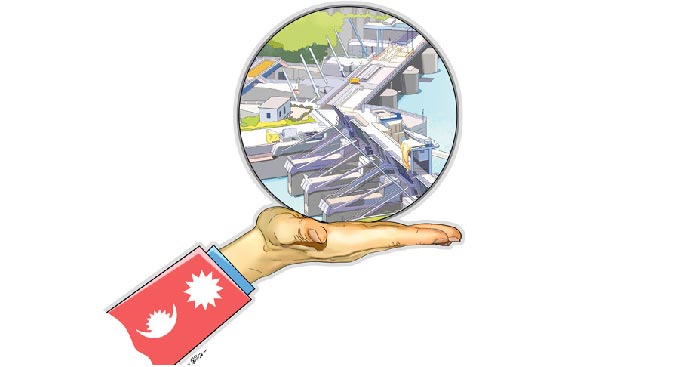
Today, economic, social, educational, scientific, environmental and professional development has been accelerated in the country through electricity development. According to the Economic Survey 2018, most indicators of the economy indicate that there is a regular supply of electricity to remain positive. Regardless of industrial or technological development, regular supply of electricity forms the cornerstone of the country's overall development and prosperity. Electricity has contributed significantly to the prosperity of the country due to the unique contribution of increasing industrial production and productivity, facilitating trade and commerce, minimizing theft in the society, maintaining environmental cleanliness, reduction in import of petroleum fuel, reduction in destruction of forests, supporting the rule of electricity, making human life simple and comfortable.
Electronic governance is the conduct of governance through the use of electronic information and communication technology to make the governance system more effective, transparent and accessible. Electronic governance, considered to be a paperless government, flows through the computer-based on management information systems and networking. In Nepal today, the constitution of Nepal, the Electricity Trade Act, the information technology policy and the use of social media by government agencies have also emphasized on electronic governance. However, due to lack of proper technology, lack of technical knowledge and weak citizen consciousness, this new technological governing method has not been used relatively. Electricity is an essential prerequisite for the last generation. It has helped to realize the meaning of the borderless public service delivery system and the paperless office of the government. The government has recently launched a campaign to use the power regime that has been spreading globally as a protector of glorious times.
Electronic governance works to enhance government efficiency as well as promote transparency, control corruption and ensure maximum citizen participation in citizen empowerment and governance. With the maximum utilization of information and communication technology in the public affairs process through electronic government, the presence of government is available whenever and wherever it can be considered as one of the most important tools for maintaining good governance.
Regardless of the government's expanded scope, good governance is considered as the goal of good governance by providing service recipients with close contact with the government and receiving maximum rewards from minimum labor, time and expense. Which is made possible by electronic means today. With the establishment of a comprehensive infrastructure of information and communication that has been preparing for the past two decades, it is now necessary for the government to set distinct policies and programs for the operation and promotion of the government sector through electronic devices. In such policies and programs, it is imperative to formulate and implement an electoral governance strategy with immediate, medium-term and long-term thinking to make the use of electric governance more timely, qualitative, convenient, transparent and cost-effective by the citizens and public institutions.
Today, the world has become a village due to electrical appliances. Its development and expansion are also moving in an unimaginable way. In the past, the use of letters, telephones, wireless, etc. to transmit news from one place to another, has been done today through computers, mobiles, and phones. Due to its use, there is a lot of staffing, a lot of work in a short amount of time, a lot of work at a little cost, a lot of work in a little space, a lot of hard work and a lot of hard work.
According to a UN survey conducted in the United States, the Republic of Korea is at the forefront of the electronic governance index. Similarly, Germany has implemented a project called D3 and set an example. Under this, one-stop e-service is provided. Similarly, Singapore is another nation that has achieved rapid development in a short period of time. Electricity is implemented through the master plan there. One thousand 5 kinds of online services have been made available through the ten-year electronic long-term plan created by the government. In the neighboring country of India, work has been carried out in the promotion of electronic governance under the concept of public-private partnership. There are 19 types of public services flowing through the Van Stop e-Governance Center in Gandhinagar, the capital of Gujarat province.
In this regard, various central bodies have also built and operated their website in Nepal. The decisions and information of the Council of Ministers have been put on the website. Employee information system of the Ministry of Federal Affairs and General Administration has been put into practice. Under the Ministry of Finance, the Budget Management Information System, Thematic Ministry Information System, Automatic Customs Statistics System, Single Account Funding System and Department of Revenue have provided income tax, inter-tariff, value-added tax through e-Pan. The Public Service Commission has launched online service in the application form collection. Similarly, the Nepal Police has used various types of electronic devices in practice. The Supreme Court has updated the case for online information. Kathmandu Municipal Corporation has implemented registration work. Banks and financial institutions have started e-banking and ABBS services, computerized knowledge and programming in educational institutions and curriculum have been started. Computer education has been put into practice.
The development of information technology is more concentrated in urban areas and the expected expansion is not possible at the district and local level in the village. Website installed by government agencies is not updated. The government has not drafted laws against cybercrime as needed. Access to the Internet is not available in all the district offices. A country that does not use electronic rule is likely to be isolated from the world stage today. Nepal should adopt and promote electronic governance everywhere by keeping this sensitivity at bay. From this, the digital Nepal vision of Prime Minister KP Sharma Oli is bright and the long-term aspirations taken by the Government of Nepal seem to be fulfilling the slogan of prosperous Nepal: Happy Nepali.
(Author Bhola Sharma is the administrative authority of the Nepal Electricity Authority.)





